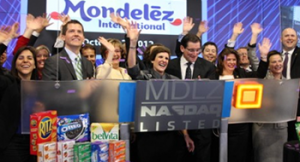‘We’re not sitting idly by and accepting dismal gum sales’, says Mondelēz CEO
 While Mondelēz is not expecting a significant turnaround in gum this year, the world’s #2 gum maker behind Wrigley is “actively testing a number of ideas to rejuvenate the category” that are just starting to pay off, CEO Irene Rosenfeld told analysts yesterday.
While Mondelēz is not expecting a significant turnaround in gum this year, the world’s #2 gum maker behind Wrigley is “actively testing a number of ideas to rejuvenate the category” that are just starting to pay off, CEO Irene Rosenfeld told analysts yesterday.
Global gum and candy revenues remain disappointing, declining 1%. The decrease was driven entirely by gum’s poor performance in developed markets. Here revenue was down high-teens as category trends continue to soften. We also lost some share.”
The decline was particularly evident in the US, where gum and candy revenues slumped about 10% due to gum weakness, she said.
“But I assure you we’re not sitting idly by and accepting these trends. We’re actively testing a number of ideas to rejuvenate the category and we have begun to roll out several initiatives to stem our share declines.”
These include changing price/size architectures (more small packs at lower price points and more value offerings in larger pack sizes); “hard hitting advertising” focusing on functional benefits such as oral care; driving better placement; and getting the right product assortment on shelf, she said.
We are starting to see some early signs of success
Early results from these initiatives have been encouraging, she said, “But due to the sheer breadth of retail outlets to be addressed as well as the timing of shelf resets rolling out these initiatives broadly have taken much longer than we would have liked.
“But we are starting to see some early signs of success and as we look at markets like the US, you will not have seen the April shares yet, but when you see them you will see where our share is up about almost 2 points. So, we are starting to see some impact from these actions.”
Meanwhile, gum sales in emerging markets are growing nicely, she said, notably in China, which is now the second largest gum market in the world.
Developing markets are growing at quite healthy rate and China is one of them.
“I would say we feel quite good about our early results, we have got a share about 5% share and it’s certainly performing consistent with our expectations and we view this entry as very complimentary to our biscuit business because in effect we’re basically putting gums on top of the biscuit infrastructure.”
Q1, 2013 highlights
First quarter revenues at Mondelēz rose nearly 1% to $8.74bn, ahead of Wall Street’s estimate of $8.68bn.
However, organic revenue, which strips out the impact of acquisitions, divestitures and other one-time issues, rose 3.8%, below the company’s long-term target of 5 to 7% growth.
 In a note on the Morningstar analyst Erin Lash said: “For the first time in its six months as an independent company, Mondelēz finally recorded a sequential acceleration in its top line. However, at just 3.8%, underlying sales growth still lagged the firm’s 5%-7% long-term target.
In a note on the Morningstar analyst Erin Lash said: “For the first time in its six months as an independent company, Mondelēz finally recorded a sequential acceleration in its top line. However, at just 3.8%, underlying sales growth still lagged the firm’s 5%-7% long-term target.
“Revenues were hindered by lower coffee prices, capacity constraints, and its ailing gum business, pressures that we don’t think will fade over the next several quarters.”
But she added:
“We are encouraged that the firm is spending behind advertising its brands, improving its routes-to-market, and increased sales capabilities to right its ship.”
PepsiCo merger rumors
Commenting on rumors that a tie up with PepsiCo’s snacks division may be in the pipeline following reports that investor Nelson Peltz has been amassing stock in Mondelēz, she said: “We think any transaction could unlock additional value for shareholders, given the premium price that would be required.
“More specifically, we believe Mondelēz’s stock could be worth about $38 per share. Excluding synergies, such a deal would value Mondelēz at 13.8 times EV/EBITDA, but could drop to less than 11 times when our forecast for $1.8bn of synergies is taken into account.
“These synergies equate to 4% of Mondelēz 2016 revenue (compared with 3-7% synergies as a percentage of sales obtained from other packaged food acquisitions).
“What remains to be seen is whether: (1) the firms can come to terms on a buyout, (2) the credit markets could support the nearly $46bn of debt needed to consummate the deal, and (3) regulators would ultimately approve such a transaction.”
Asked about the merger speculation, Rosenfeld told reporters yesterday that “there’s no question that there’s lots of chatter out there”, but said she was not planning to comment on it.
Mondelēz’s open innovation director Stu Stein will be speaking about how open innovation works at Mondelēz at the Food Evolution Summit in Litchfield Park, Arizona on September 17-18.


































